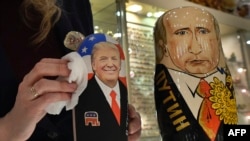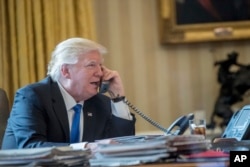Once, there was effusive coverage on Russian state media.
Once, Duma lawmakers offered champagne toasts and ovations to celebrate “our man in the White House.”
And once, above all else, there was optimism: a sense among Russians that, after years of deeply contentious relations between the Kremlin and the Obama administration, a Donald Trump presidency would usher in a new era in U.S.-Russian relations with Trump's pledge to “do deals” with Vladimir Putin.
Yet, after a rocky month of mixed messages from the Trump White House, there are growing signs in Moscow that the Trump-Russian relationship is in need of serious counseling.
The popular tabloid daily Moskovskie Komosomolets was among the first Russian publications to sound the alarm:
"It's time for us to end our 'romance' with Trump," columnist Mikhail Rostovsky wrote. "It's completely obvious that Trump doesn't have the political resources to turn around American politics in relation to Russia."
"We need to distance ourselves from false illusions. The quicker the better," Rostovsky added.
Candidate promises vs. presidential policies
Indeed, Russians' second-guessing comes from a rift between Trump "the campaigner" and Trump "the presidency."
Candidate Trump repeatedly voiced support for key issues of importance to Moscow, such as Ukraine, NATO and Syria. Candidate Trump suggested relief from Western sanctions imposed over Russia's actions in Ukraine was a real possibility.
Yet those statements seem to be quickly running aground in President Trump's administration.
Over the past several weeks, top Trump administration officials - from the vice president to the secretaries of state and defense as well as the ambassador to the United Nations - have all pulled back on suggestions of a quick pivot in relations with Moscow.
The dismissal of National Security Advisor Michael Flynn, who had been widely viewed in Moscow as sympathetic to Russia, from Trump's national security team proved cause for further concern. Flynn backchanneling to Russian diplomats before the inauguration proved cause for further concern.
Since then, the administration's opposition to sanctions relief, in particular, has hardened – embittering Russia's political elite in the process.
Several high-ranking lawmakers have accused Washington’s political establishment of plotting to undermine Trump’s desire for better relations.
But Vyacheslav Volodin, the speaker of the Duma and a key adviser to the Russian president, was among those who let his dissatisfaction with Trump be known directly.
“One must start by fulfilling one’s campaign promises,” Volodin complained, arguing that Americans had supported Trump in part for his desire to repair U.S.-Russian relations.
Kremlin camps
Indeed, changing perceptions of the Trump administration have divided normally united pro-Kremlin camps – prompting conflicts that border on the bizarre.
Last week, members of the pro-Kremlin National Independence Movement showed up outside state media’s Rossiya Sevodnya headquarters in downtown Moscow to protest “the cult of Trump.”
In subsequent interviews, NIM’s leader, pro-Putin lawmaker Evgeny Feodorev, accused Putin’s chief propagandist, Dmitry Kiselev, of heading an “anti-Putin conspiracy“ with his fawning coverage of Trump.
Kiselev used his weekly Vesti Nedeli program to denounce Feodorev’s charges as trivial, but observers noted that Trump coverage was noticeably absent from the broadcast. (Disclosure: a separate Vesti Nedeli news segment attacked the recently launched VOA/RFE Russian language online news channel "Current Time.")
Same channels, different news
Indeed, after months of wall-to-wall coverage of the American elections on state media, coverage of President Trump is now hard to find.
Kremlin officials insist the shift in tone is no more than Russians tiring of the Trump story.
But others aren't so sure.
"By the tone of Russian channels, it's been impossible to understand: either Donald Trump was elected president of Russia or Vladimir Putin won the U.S. presidential elections," writes Lev Schlossberg, a liberal politiican with the Yabloko party, in a blog post about media coverage of Trump's victory.
Only "Trump turned out to be the president of the United States," continues Schlosberg, noting that the U.S. administration had come out against Russia's annexation of Crimea.
"As happens with children and teenagers, it went from love to hate -- in one step," he adds.
But Ekaterina Schulmann, a Moscow-based political analyst, told VOA the shift was by design.
Russian media, Schulmann argued, became "too enamored" with the Trump story, chasing Putin from his honored top spot in Russian news coverage.
"This could not be endured," she said. "There can be only one star in our Cyrillic world."
Investigations everywhere
Lost on no one – in Washington or Moscow – are multiple investigations into alleged ties between the Trump campaign and Kremlin officials in the run-up to the November elections.
The FBI, Congress and independent media are all looking into Trump’s Russia ties with intense interest.
Indeed, President Trump seemed to acknowledge the potential constraints they presented to détente with Moscow during his first official press conference earlier this month.
"Probably Putin assumes that he’s not going to be able to make a deal with me because it’s politically not popular for me to make a deal," Trump said.
"I don’t know that we’re going to make a deal. I don’t know. We might. We might not," he added.
Kremlin calm?
Nonetheless, not all in Moscow were ready to pull the plug on détente with the Trump White House.
Sergey Markov, a pro-Kremlin political analyst, was among voices insisting the new American president simply needed more time.
“We understand that Trump isn’t ready to take on foreign policy,” wrote Markov in a post to Facebook. “The time for improving ties with Russia will come only after Trump is stronger domestically.”
And as for panic in the Kremlin? Fear not, insisted Markov: “They’ve got iron nerves. Neurotics don’t last there long.“











